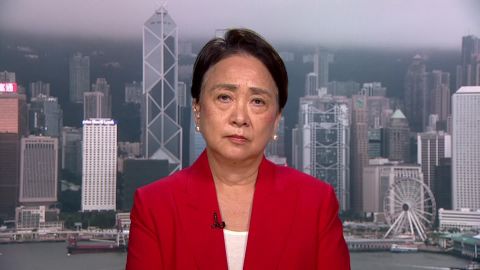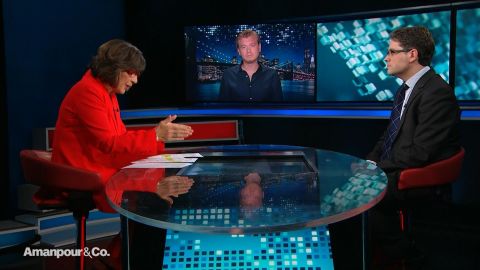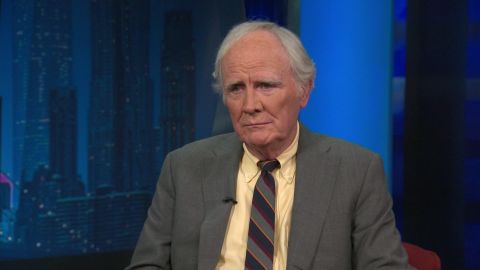Read Transcript EXPAND
CHRISTIANE AMANPOUR: And now we move on to the Catholic Church, almost two decades after the sex abuse horrors were brought to light, a new Pew poll finds almost 70 percent of U.S. Catholics say abuse by the clergy is an ongoing problem. The poll also found more than a quarter say they’re skipping church more often and pulling back on their donations because of this scandal. Author James Carroll is one of the disillusioned but he is no ordinary churchgoer. He is a former priest and he now has this radical idea for how the church can save itself, abolish the priesthood altogether. Our Michel Martin digs in.
(BEGIN VIDEO TAPE)
MICHEL MARTIN, CONTRIBUTOR: James Carroll, thank you so much for talking with us.
JAMES CARROLL, CATHOLIC SCHOLAR/JOURNALIST: My privilege, Michel.
MARTIN: Your piece, “Abolish the Priesthood”, posted a couple of weeks ago now, and almost immediately there was this very emotional and angry reaction. And I was wondering what you make of it.
CARROLL: Well, I’m not surprised. I’m proposing something that sounds radical. I’m calling for a fundamental change in the structure of the way the Catholic Church is organized, understands itself, in a way that focuses on the single most central figure in the church, the priest. And to call for the abolition of the priesthood, by which I mean the dismantling of the structure of the priesthood as we know it, seems especially to priests to be a kind of assault on them individually. So, a good bit of the pushback was from priests who felt insulted by what I was saying.
MARTIN: This notion, the central notion of your piece, that the priesthood must be abolished in its current form, what was the breaking point for you?
CARROLL: Well, the breaking point came last summer when there was an avalanche of fresh new wave of scandalous revelations about the church, the grand jury findings in Pennsylvania. There were civil actions against the church in Germany. There were U.S. attorneys and district attorneys and attorneys general bringing charges against the church in diocese around the United States. And then for me, there was the climactic visit of Pope Francis to Ireland which took place at the end of last summer. Ireland is ground zero of the church abuse scandal. Almost every family in Ireland has some intimate connection with a victim. The Catholic Church has been devastated in Ireland. When Pope Francis went there, I expected a kind of major signal of reckoning with this. Why go to Ireland and pretend that’s not — that’s not what’s been happening? And he went to Ireland and expressed what felt like bromides of shame and sorrow but no signal of reckoning, no indication of a new structure of accountability, no looking hard at the ways in which cover-up bishops are still not held accountable, no looking hard at severe and real and lasting penalties for predator priests. So, Pope Francis’s failure to reckon with this scandal in Ireland was the breaking point for me because I so admire Pope Francis. He has been the center of my hope as a Catholic now for most of a decade. And when a revolutionary figure like him shows signs of being in the grip of clericalism, which I identify as the problem, that tells you how deeply into the imagination of the church clericalism goes. Francis, too, is at the mercy of it. And when I realized that, when I saw it in a way I couldn’t deny, I began this journey into what I’m calling my own fast and abstinence from normal practice of the church as a way of refusing to go on with business as usual as a Catholic.
MARTIN: You write that clericalism, with its cult of secrecy, its theological misogyny and its hierarchical power is at the root of Roman Catholic dysfunction. Talk to me about that, if you would. What is clericalism for people who are not familiar with it? Why is it at the root?
CARROLL: It’s the basic idea that priests are in a different category of being. They’re above us. When a priest is defrocked, what do they say? He’s reduced to the lay state. He’s brought down to be like the rest of us. This notion of priests as a caste apart, especially when it’s built on the denigration of sexuality, the symbol of that is mandatory celibacy, as if sexual activity on the part of priests would somehow make them impure. And clericalism is also built on the all-male character of the priesthood, which is especially outrageous because it’s a grievous offense against justice. It’s a way of essentially denying the equality of women in the church, in the human species. Why aren’t more Catholics enraged, protesting this unjust exclusion of women from the priesthood? If the Catholic Church said that black people can’t be priests, what would the world reaction be? The world would not tolerate it. It’s not the same to say women can’t be priests but it’s akin to it. And the world deflects that. Essentially, the Catholic Church deflects it and priests deflect it. Women are equal to men. Hello? Is this a moment when we can reckon with that in a new way? I hope so. Why does the Catholic Church exempt from that reckoning?
MARTIN: Well, I think then, some might argue then the answer is not to abolish the priesthood but to include women, right, but that’s not what you’re saying.
CARROLL: Well, if you include women, if you include married people, if you remove the identification of clerical power from sacramental ministry, these are elements of a reconstituted priesthood, a dismantling of the priesthood as we know it. I’m not calling for the end of sacraments. I’m not calling for the end of the mass. These are the central, core elements of the Catholic faith. There will always be the mass. There will always be someone enabling the mass to take place. Does it have to be a member of this pyramid of power that is by definition denigrating of women, denigrating of people who are not clergy? The pope at the top, bishops at the next level, priests at the next level, and down here, the population of lay people? No, the church is the people. And a priesthood that reflects that basic truth would look very different from the priesthood we have now.
MARTIN: So, I want to go to some of the criticisms of your piece. Your theology is flawed. You’re mad because people don’t listen to you, et cetera. But there was this argument that look, if — as you’ve said yourself, a small minority of people, even though the number is large in the aggregate, the harm is very large in the aggregate, it’s a minority of priests. So, one argument is that if the problem was a structural, as endemic to the priesthood as you say, it would be larger. What would you say to that?
CARROLL: Well, I’m not saying that priests are more inclined to abuse children than other people. The most dangerous place in the world for children is their family, uncles, boyfriends, parents abuse children. So, I don’t want to be understood as saying priests are especially dangerous. The signal of dysfunction comes, yes, from the misbehavior, the predatory behavior of priests, which is, frankly, in a category of its own because of the claims we Catholics make for priests. But the real signal of dysfunction is what happens when abusive priests are uncovered and when the vast majority of bishops, a minority of predators, the vast majority of bishops protect the predator instead of the children. Look, if it weren’t for the press and now law enforcement, the abusive behavior of that minority of priests would still be going on. It would still be covered up and the bishops would still be enabling it. That’s the signal of a grotesque dysfunction of the whole structure of clericalism, that pyramid I’m talking about.
MARTIN: I do understand your argument but if you’ll indulge me —
CARROLL: Sure, sure, sure.
MARTIN: — I do want to hear a little bit more about you for people who aren’t familiar with you.
CARROLL: Of course.
MARTIN: You were born a Catholic. You embraced the church through your entire childhood and frankly, you made the very specific and difficult decision to join the priesthood or maybe it wasn’t a difficult decision. I was wondering what attracted you to the priesthood, to begin with.
CARROLL: Well, I was a religious boy, raised in a — I hesitate to use the word devout, make it sound like my parents were pious, they weren’t. But I was raised in a solidly Catholic family, Irish Catholic. The church was at the center of our family life. For God and country, that was my father’s motto and I took it in. It was very natural for me as a child to look up to the priests. The priest was the source of consolation, encouragement, affirmation, meaning, especially for us Irish Catholics. I loved being a Catholic priest. I was lucky because I was a priest during the heyday of the Civil Rights Movement. I was recruited into it, challenged in my conservative and racist upbringing. It was the heyday of the Peace Movement. I grew up in the military. My dad was in the military. I became a part of the Peace Movement. All of that because I was in the seminary and the priesthood. The Catholic priesthood gave me my stance on life to which I am trying to be faithful even now. And when I left the priesthood after a mere five years, I found it possible to embrace my Catholic identity in a new and equally firm way and I’ve been a Catholic all these years.
MARTIN: Would the Catholic Church be Catholic without priests?
CARROLL: It would be different. The form the priesthood will take after this crisis is unpredictable in some ways. There will still be people presiding at, enabling the sacraments. There will — they will be, in my own view, they will come from the community, but they won’t be bureaucrats in the power structure of a futile and monarchical church. That’s what the priesthood has become. That’s what the priesthood is now. The priesthood as we know it owes more to the middle ages and to the Roman empire than it does to the Gospel. Look, one of the ways in which I’m criticized is to say, well, he just wants the church to be a democracy. Well, actually, that’s true. I think that — I don’t mean by that it has to go by majority rule but the values of liberal democracy need to be brought into the life of the church, transparency, accountability, radical commitment to the equality of every member of the community. None of those three things are characteristic of the Catholic Church today.
MARTIN: Other denominations, if I may say, that are more democratic than the Catholic Church are also struggling.
CARROLL: Sure.
MARTIN: And they are struggling with people who have abused the vulnerable. They are struggling with impulses that many people consider anti-LGBT, OK? So what I’m saying is democracy doesn’t necessarily lend itself to a more humane, inclusive approach, right?
CARROLL: No, but it lends itself to structures of self-criticism and ways of reckoning with the flaws that are part of every institution. I’m not foolishly calling for a perfect institution. There would be no place in it for me if it were perfect. Believe me. I’m calling for an institution that is capable of correcting itself. Three weeks ago, the Vatican issued the long-awaited new policy on how to deal with the abuse by clergy of children and it’s yet another failure of self-correction. Most powerfully symbolized by the fact that it requires the reporting of allegations of abuse but to church officials, not to civil authorities. I beg your pardon. This is the end of this long process we’ve been going through for years. The bishops are finally going to tell us how they’re going to do it and the way they’re going to do it is report allegations to other bishops, bishops looking after bishops. I beg your pardon. This is an institution that still is not showing signs of being able to be self-critical and change and that’s what I’m looking for.
MARTIN: How do you feel now that you put this before the public? I know that you have been sort of grieving, privately, for some time.
CARROLL: I feel two things. I’m quite distressed to have come to this place because I am a practicing Catholic or I have been. I’m insisting now on my Catholic identity but in a new way. It’s — there’s a kind of loneliness of the exile. That’s what I feel. But I feel something else, more powerfully. I feel that this is a turning point moment in the history of the church. This is a moment of full revelation of the dysfunction. It’s blatantly obvious. And one of the signs of that is the way in which so many people are walking away from the church. I think those people are still Catholics. And I think they’re walking away as an affirmation of value and I’m inviting them to continue to think of themselves as Catholic even if they don’t want to submit to the disciplines of the bishop or the clericalists.
MARTIN: And you said yourself —
CARROLL: In other words, I feel like this is a moment of grace for the church because the truth is that — is the beginning of real authentic change and we’re seeing the truth of the church’s condition now.
MARTIN: I’m reminded of –I don’t know who was the author of this. I sort of think of it as the underdog’s creed. First, they ignore you, then they laugh at you, then they fight you, then you win. Do you envision that in your lifetime, things will change?
CARROLL: Well, I don’t see winning. But even the priests and the critics who are pushing back at what I’m saying have to reckon with the problem I’m lifting up and to which I’m responding, however imperfectly. They have to reckon with it. And the fact that the Vatican has yet to fully begin to reckon with this problem only is going to force the issue further. The single largest reason I have hope for institutional change is the power of the feminist revolution. I wouldn’t presume to speak for women. But I am a feminist and I have been brought through feminists to understand the urgent importance of affirming the equality of women in every sphere. And clericalism is built on the affirmation of the inequality of women. Clericalism is an institution of male supremacy. The Catholic priesthood is an institution of male supremacy. That’s the single largest point about it. And my hope, of course, is that the Catholic priesthood will not be the only institution on the planet that is able to push back and stand up against the feminist revolution. Women are simply too powerful for that to happen.
MARTIN: There are those who would say, join another religious group, become an Episcopalian.
CARROLL: Yes, it’s true.
MARTIN: There are women priests. There are women bishops.
CARROLL: It’s true.
MARTIN: And there’s a —
CARROLL: And I fully respect the impulse to move to another denomination and many Catholics I know have quite happily. My wife’s an Episcopalian. I’ve often worshipped with Episcopalians. I have a kind of home feeling for the Episcopal Church which does embody many of the values I’m calling for with Rome but my Catholicism is in my marrow. If I had left the church and was hurling my criticisms from outside of it, they would mean something different. I’m declaring my loyalty to this institution, but I’m a conscientious objector to it. That’s different than someone who’s left the country. So that’s my largest reason for not leaving the country.
MARTIN: James Carroll, thank you so much for talking with us.
CARROLL: Thank you. It’s my pleasure.
About This Episode EXPAND
Emily Lau joins the program to discuss a controversial bill being pushed forward in Hong Kong. Eliot Higgins and Christiaan Triebert discuss the new documentary “Bellingcat: Truth in a Post-Truth World.” Former catholic priest James Caroll explains why priesthood should be abolished.
LEARN MORE


